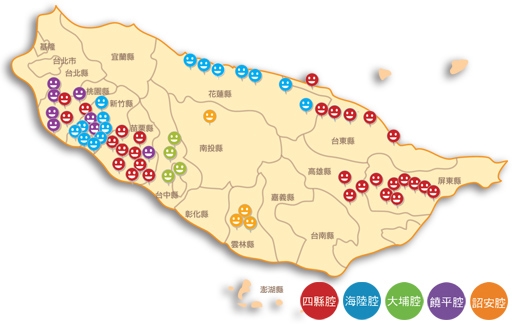Hakka Christianity / Mission in Taiwan 台灣的客家宣教事工
Hakka population in Taiwan
18.7% (2016), According to the 2004 Taiwanese Hakka population survey, 2.859 million self-identified themselves as Hakka; those who find themselves capable of accepting two or more identities, 4.412 million; and 6.084 million identify themselves as Hakka or are descendants of Taiwanese Hakka. In Taiwan, there is one Hakka for every 3.7 individuals.
 Language
Language
Hakka, spoken in five different types (Sixian, Hailu, Daipu, Zhoan, Raoping) is the majority language again. There are also the northern Xihai dialect and the patchily-distributed Yongding, Fengshun, Wuping, Wuhua, and Jiexi dialects. Many Hakka also speak Minnan and Mandarin very well, in fact not every Hakka speaks one of the Hakka languages. The creation of Hakka-speaking campus environments in Hakka language schools are multiplying annually; the implementation of Hakka language classes and number of participants is steadily increasing. The Hakka Accessibility Project, the promotion of Hakka language in the arena of public transportation, and the broadcasting and growth of Hakka TV, along with a variety of radio, internet, and publications have all helped to bring Hakka language back into real life usage. (http://www.hakka.gov.tw/ )
► Member Churches of CHEA: 105 (2014)
► Hakka Church Denominations: 17 (2008)
► Percentage of Christians: 0.35% (2014)
► Christian Hakka Seminary(CHS): in Longtan, (www.chs.org)
► Missions involved: 4 (2015), through the needs of the CHS
► Hakka Chinese Bible Translation: full bible available since March 2014
Plans
The CHS pushes since 2005 pushed a 10 year church planting and -strengthening project aiming to multiply the number of Hakka fellowships, ministries, prayer-groups and churches and to unify them behind the Christian Hakka Seminary project in Longtan which is regarded as a key project to longterm reach the 99,65% unreached Hakka of Taiwan with the gospel with their own resources and combine Hakka culture preservation with the indigenization of the gospel in their culture together.
Needs for Missionaries
Yes. There is still an urgent and longterm need for assistance. Good English as a prerequisite to learn good Hakka or Mandarin is required for church planting.
History
The Hakka were the first Chinese to enter South Taiwan in the 7th century A.D. Ever since waves of Hakka migration them from several places of the mainland populated the old Taiwan of Aborigine with a new people. They all spoke a Hakka language , were diligent and built traditional homes, made with black brick or white plaster walls and black tile roofs.
The Hakka are also renowned for their community spirit, which is exemplified by their weilongwu house. Examples of this traditional Hakka houses with semicircular sections for self defense added can be seen in Dongshi Township in Taichung County as well as in Neipu Township / Pingtung County.
Hakka traditions include the worship of the Three Mountain Kings and Yimin (ancestors who sacrificed their lives to protect their homelands), tea-farming opera, and folk songs. The oilpaper umbrella from Meinong in Kaohsiung County is a famous Hakka handicraft.